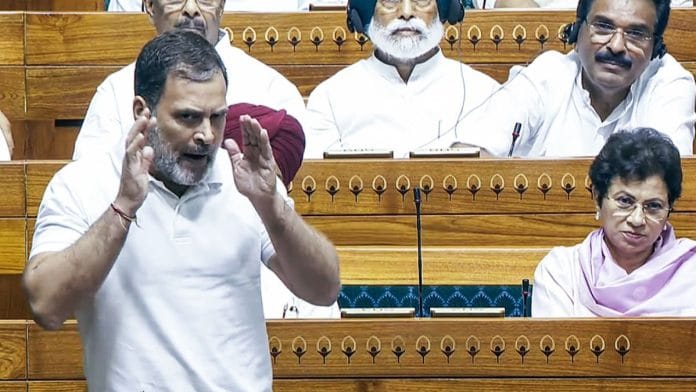New Delhi: If Donald Trump is lying about persuading India to halt its military action against Pakistan during Operation Sindoor, then Prime Minister Narendra Modi should call the US President’s bluff on the floor of the House, Leader of the Opposition in the Lok Sabha, Rahul Gandhi, said Tuesday, launching a sharp attack on the Centre’s political leadership.
Gandhi accused the Modi government of undermining the military by “tying their hands behind their backs” during the strikes against Pakistan. He alleged that the true goal of the operation was not national security but to shield the prime minister, whom he said has “blood of the people of Pahalgam on his hands”.
“The goal of this exercise was to protect the Prime Minister because he has the blood of the people of Pahalgam on his hands. After that, Donald Trump has said 29 times that he brokered the ceasefire. If he (Trump) is lying then he (PM) should say that in his speech. If he has the courage, then the PM should say that Trump is lying. If he has the courage of Indira Gandhi, let him say that Donald Trump is a liar. Even if he has 50 percent of Indira Gandhi’s courage,” Rahul said.
Targeting Modi, Rahul said, “The nation is above your image, your politics and above your PR (public relations). The forces are above your PR, your image and politics. Have the humility to understand that, dignity to understand that and do not sacrifice the armed forces and national interest for your own petty political gains.”
In his initial remarks, Rahul said that the Pahalgam terror attack was organised and orchestrated “clearly by the Pakistani state”, attempting to address the flak that the Congress has been facing from the BJP over former Home Minister P Chidambaram’s remarks that the security agencies have so far not produced any evidence to link the perpetrators of the attack to Pakistan.
He said it was a reflection of the failure of Indian foreign policy that “no country” directly condemned Pakistan for the Pahalgam attack. “Instead we saw the chief architect of the attack, Pakistan army chief Asim Munir, having lunch with US President Trump at the White House.
“Our PM cannot go there. The PM does not say anything. The mastermind of the whole operation is having lunch with President Trump. The president says that he wanted to thank him (Munir) for not going into the war and ending it,” Rahul said.
The bigger danger, said Rahul, was a “fusion” of the militaries of Pakistan and China that was on display during Operation Sindoor in May.
“India’s biggest foreign policy challenge has been to keep Pakistan and China separate. But you have destroyed the single biggest goal of Indian foreign policy. The truth of what happened is that the government of India thought they were fighting Pakistan and when they arrived they suddenly realised they were fighting China and Pakistan. The doctrine of the Pakistan Air Force was completely changed and the Chinese were feeding critical battlefield information to the Pakistanis,” he said.
Rahul was severely critical of External Affairs Minister S. Jaishankar in his speech which lasted a little over 30 minutes. He said Jaishankar lacked understanding of modern warfare and how it has evolved in recent decades. He also questioned the Centre’s claim that Operation Sindoor would act as a “deterrent”.
Rahul, citing remarks by Chief of Defence Staff Anil Chauhan and India’s defence attache to Indonesia Captain Shiv Kumar, claimed that Defence Minister Rajnath Singh’s speech in the Lok Sabha Monday revealed that the armed forces lacked the freedom of operation and manoeuvre due to the political constraints put on them by the Modi government.
Government lacked the political will to fight: Rahul
Rahul said, “The defence minister said that Operation Sindoor began at 1.05 in the morning and it lasted 22 minutes. And then he said the most shocking thing. He said that at 1.35 we called Pakistan and we told them that we have hit non-military targets and we do not want escalation. The DGMO of India was told by the government of India to ask for a ceasefire at 1.35.
“Meaning, the government of India informed the government of Pakistan that we have no political will, we don’t want to fight, we have just done this action. Immediate surrender in 30 minutes… You went into Pakistan and you told our pilots to not attack their air defence. Meaning you told our pilots to go and attack and face the air defence system of Pakistan. Meaning you tied their hands behind their back,” Rahul said.
(Edited by Viny Mishra)
Also read: ‘Maun vrat’: Congress’s Op Sindoor delegation members will not be speaking in Parliament debate






